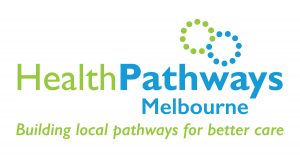
Dr Sally Stokes has worked as a GP at the Victorian Aboriginal Health Service for more than 10 years. We spoke with her recently about the issues her patients face, and how HealthPathways Melbourne has helped her keep pace with rapid change.
“The majority of our clients have chronic diseases with multiple comorbidities, as well as social circumstances that further add to the complexity of their treatment,” said Dr Stokes.
“All clients are bulk billed and most of our referrals for a specialist opinion would be into the public hospital system.”
Dr Stokes initially found out about HealthPathways Melbourne from a North Western Melbourne Primary Health Network newsletter. She has since contributed to the project by reviewing Pathways.
“I now recommend HealthPathways to colleagues, particularly in my role as a clinical educator,” said Dr Stokes.
“I use HealthPathways Melbourne daily in my work and the below is just one example of many.”
HealthPathways Melbourne in action
During a recent consultation, Dr Stokes turned to HealthPathways Melbourne as her patient had a new diagnosis of gout.
“They were asking for a good, simple resource they could take home to learn more about the recommended diet for patients with this form of arthritis. We found a resource under the ‘Information for patients’ section and were able to use this as the basis for a meaningful discussion.
“We could also easily print out a copy for the patient to take home.”
Keeping pace with change
Since completing her GP exams more than 10 years ago, Dr Stokes has been increasingly reminded that medicine is a rapidly changing field.
“New research is constantly coming to light and guidelines are regularly updated from what I originally studied,” she said.
“While I was looking at the Gout Pathway, I noticed new and incredibly useful information about using urate levels to optimise gout therapy. This is quite different from what was taught years ago. I also learned about new treatments that can be trialled if allopurinol fails as a prevention.”
Making life easier for GPs
Dr Stokes said that while GPs take a huge responsibility for their ongoing learning, “it is simply not possible to be completely up to date on every single presentation that comes through our door. HealthPathways Melbourne changes that.
“The Gout Pathway provided me with guidance on how to best control and prevent gout in general practice. It provided me with the confidence and clear guidelines to suggest new therapies to patients who do not respond to established treatments for gout.
“This will decrease the number of referrals I make into public hospital clinics and lessen the need for phone calls for advice to overstretched specialist teams. This helps free up appointments for patients who need them the most.
“It is enormously helpful to have clear guidelines agreed across all the hospitals about what referrals they will and won’t accept.”
Better care and communication for patients
Dr Stokes has found that is beneficial to be able to show patients the clear written guidelines that must be met before their specialist clinic referral can be accepted.
“This helps communication with patients who may be eager to ‘just get a referral’; this attitude can often be an attempt to avoid the need for repeat visits to their GP,” said Dr Stokes.
“The clear HealthPathways process encourages patients to have the relevant tests done and return to see me before being referred on to a public specialist clinic. It also supports me to manage the conditions I can manage before making a referral.”
HealthPathways Melbourne is improving connections between health systems
Rather than HealthPathways diminishing her role as a GP, Dr Stokes has in fact found the opposite to be true.

“The platform has made it clear to me that the message from specialist clinics is that GPs can effectively manage these conditions without external input,” she said.
“The Pathways encourage GPs to continue managing patients until they really need to be referred into a specialist system. This is better for everyone.
“Another huge benefit is that the Pathways are locally relevant. If you are referring a patient into a region that you are not familiar with, the platform makes it very clear which hospitals provide which service. It can be time consuming trying to discern this information from multiple sources, such as websites and phone calls.
“I truly believe HealthPathways will help us GPs to provide quality referrals into the hospital system; referrals that we genuinely wish to provide. The Pathways are not exhaustive information about each topic, but this is not their aim; the beauty of the Pathways is that they allow the doctor to quickly collate all the information they need in a clinically useful and locally relevant format.”
Are you a GP or health professional in our region who doesn’t have access to HealthPathways Melbourne? Request access online or contact info@healthpathwaysmelbourne.org.au




